For over 55 years, Webster University’s Sargent Conservatory of Theatre Arts has trained students to work as theatre professionals. Our performance and production opportunities remain unmatched, so our audition and interview process is a vigorous one. To learn more, explore the resources below.

Get Started Today
At Webster's Sargent Conservatory of Theatre Arts, we'll help you achieve academic excellence preparing you for future career successes. The first step is to fill out our application.
Select your program from the list below to:
- Schedule your audition or interview
- Learn requirements and how to prepare

“I want to spark change by provoking thought through performing, which hopefully, leads to action. I want people to walk out of the theatre more empathetic to the world around them from when they walked in.”

BFA in Acting, ’24
Acting
To Schedule, Please Complete Audition Request Form
You must submit your application to the University prior to requesting an audition. You will log into your application account, and then use the drop-down menu to choose the Conservatory form to complete. Auditions are scheduled through the Fine Arts Audition Coordinator.
Auditions for Performance Programs
Auditions for our performance programs (Acting, Directing, Musical Theatre) can only be scheduled on the designated dates, outlined below. Individual appointments are not available.
Step One
Apply to Webster University. You can apply through our website at webster.edu/apply, or through Common App or the COALITION App.
Step Two
Complete the Audition Request form and submit a $30 fee. Upon applying to the University, you will also receive an email with this link.
Step Three
After we receive your Audition Request form, the audition coordinator will contact you with information on how to schedule a date and time for your audition.
On-Campus Audition Dates
- Friday, Dec. 5, 2025
- Saturday, Dec. 6, 2025
- Friday, Jan. 23, 2026
- Friday, Feb. 20, 2026
- Saturday, Feb. 21, 2026
On-campus auditions can be helpful since the prospective student is able to spend the day on campus not only auditioning, but also meeting with faculty and students, and touring the campus facilities.
For Acting auditions, check-in commences promptly at 8:30 a.m. and auditions will conclude by early afternoon.
Students should come dressed in comfortable clothing and be prepared for a brief group warm-up session. Following the warm-up session, students have time to change before their audition. They will perform the audition pieces on an individual basis. Students may be asked to do various exercises and improvisations during their audition and should be prepared to discuss their work on the audition pieces.
Auditioning students have the option to visit classes as schedules permit, except on Saturday. They also are encouraged to view a performance while on campus. We strongly advise that students coming from some distance arrive the night before. Auditioning students will need to make their own arrangements for an overnight stay. Information on recommended hotels can be found at webster.edu/visit, under Accommodations in St. Louis.
Off-campus auditions and interviews are held in locations throughout the United States in conjunction with the Unified Auditions to accommodate those students who are not able to audition on campus.
Off-Campus Audition Dates for 2025
New York, N.Y.: Unified Auditions
- Saturday, Jan. 24, 2026
- Sunday, Jan. 25, 2026
Chicago, Ill.: Unified Auditions
- Sunday, Feb. 1, 2026
- Monday, Feb. 2, 2026
- Tuesday, Feb. 3, 2026
- Wednesday, Feb. 4, 2026
- Thursday, Feb. 5, 2026
Los Angeles, Calif.: Unified Auditions
- Saturday, Feb. 7, 2026
- Sunday, Feb. 8, 2026
Locations to Meet Webster University Faculty
Sargent Conservatory faculty attend a variety of Thespian Festivals and other similar events throughout the summer and fall. Auditions at these sites for Acting are considered "meet-and-greets" rather than full evaluations. Potential candidates for our Performance programs must apply and schedule an official audition through Admissions as outlined above.
Virtual audition options are available in instances of extenuating circumstances. Please Contact auditions@webster.edu to discuss virtual audition options.
Important Notes
- Students must apply and be academically accepted to Webster University before we can release audition results for the Conservatory.
- Students seeking an audition do not need to upload materials to Acceptd. However, if students do submit through the Acceptd system, our faculty will review their materials and follow up as needed. Acceptd submissions are not considered final auditions for our programs.
Questions?
If you have any questions regarding the Sargent Conservatory of Theatre Arts or the audition process, please Contact auditions@webster.edu.
Monologues
As a prospective Acting major, you must prepare two monologues of no more than three minutes total. The selections should be of a contrasting nature. Choose characters close to yourself in age from scripts written after 1930. You must memorize and fully prepare your monologues.
Do not plan a long and involved introduction to your scene. Simply announce the name of the play and character and begin. Do not select Shakespeare or classical pieces. Do not do extreme characterizations of body, voice or speech to alter your own age, physical abilities or mental health. The characters should be as natural, authentic, and close to you in real life as you can imagine. Do not alter your dialect or accent. Use your own speech, even if the character would normally speak with an accent that is different from yours.
Props and Costumes
Feel free to use a chair if you need it. Keep the number of props and costume pieces down to one or two at the most.
Clothing
Please dress in clothing comfortable enough to allow you to do your best work, while still maintaining a professional look. No gym clothes, nothing too tight or revealing, and no heels above 3 inches tall.
For on-campus auditions, please come dressed in comfortable clothes for a movement exercise at the beginning of the auditions. You will have ample time to change into the clothes you want to wear for your audition.
Questions: Contact auditions@webster.edu.
Design
All students interested in Costume Construction, Costume Design, Lighting Design, Scene Design, Scene Painting, Sound Design and Wig and Makeup Design must interview and present a portfolio for review in order to be considered for the Sargent Conservatory of Theatre Arts.
We schedule interviews and portfolio reviews on an individual basis in St. Louis throughout the year. We also schedule interviews and portfolio reviews during the Unified Auditions in New York (January 25–27, 2025), Chicago (February 2–6, 2025), and Los Angeles (February 8–9, 2025).
- Step 1: Apply to Webster University. You can apply through our website at webster.edu/apply, or through Common App or the COALITION App.
- Step 2: Complete the Interview and Portfolio Review Request form and submit a $30 fee. Upon applying to the University, you will also receive an email with this link.
After we receive your Interview and Portfolio Review Request form, our audition coordinator will contact you with information on how to schedule a date and time for your interview. Please note that we prefer to meet you in person and encourage you to visit us on campus. Virtual interview options are available in instances of extenuating circumstances. Virtual options can be discussed after you have completed your application to the university.
Locations to Meet Webster University Faculty
Sargent Conservatory faculty attend a variety of Thespian Festivals and other similar events throughout the summer and fall. We may consider interviews and portfolio reviews at these events for Design production candidates to be full evaluations and no subsequent interview might be necessary. Prospective production majors will still need to apply and be accepted by the University before gaining admission into the Conservatory program.
Important Note: Students must apply and be academically accepted to Webster University before we can release portfolio review results for the Conservatory.
If you have any questions regarding the Sargent Conservatory of Theatre Arts or the audition process, please Contact auditions@webster.edu.
Portfolio
Students seeking an interview for Costume Construction, Costume Design, Lighting Design, Scene Design, Scene Painting, Sound Design, Technical Direction or Wig and Makeup Design must present a portfolio that showcases the variety and caliber of your work in fine arts or theatre. Your interview therefore includes a portfolio review. Such a portfolio might include pieces from the following:
- Drawings, any subject and media
- Examples of work in color
- Drafting
- Prints
- 3-D projects of any type
- Actual theatrical design work, either for a production or a project
- Photographs of projects
- Evidence of work in carpentry, electronics, mechanics, scenic construction
- Sound files
Letters of recommendation from two persons familiar with your work should be included.
We schedule interviews individually to allow ample time to review the portfolio and discuss your experience and career goals.
Questions: Contact auditions@webster.edu.
Costume Design (BFA) Lighting Design (BFA) Scene Design (BFA)
Scene Painting (BFA) Sound Design (BFA) Wig and Makeup Design (BFA)
Directing
To Schedule, Please Complete Audition and Interview Request Form
You must submit your application to the University prior to requesting an audition and interview. You will log into your application account, and then use the drop-down menu to choose the Conservatory form to complete. Auditions and interviews are scheduled through the Fine Arts Audition Coordinator.
Auditions for Performance Programs
Auditions for our performance programs (Acting, Directing, Musical Theatre) can only be scheduled on the designated dates, outlined below. Individual appointments are not available.
Step One
Apply to Webster University. You can apply through our website at webster.edu/apply, or through Common App or the COALITION App.
Step Two
Complete the Audition Request form and submit a $30 fee. Upon applying to the University, you will also receive an email with this link.
Step Three
After we receive your Audition Request form, our audition coordinator will contact you with information on how to schedule a date and time for your audition.
On-Campus Audition Dates
- Friday, Dec. 5, 2025
- Saturday, Dec. 6, 2025
- Friday, Jan. 23, 2026
- Friday, Feb. 20, 2026
- Saturday, Feb. 21, 2026
On-campus auditions can be helpful since the prospective student is able to spend the day on campus not only auditioning, but also meeting with faculty and students, and touring the campus facilities.
For Directing auditions, check-in commences promptly at 8:30 a.m. and auditions will conclude by early afternoon.
Students should come dressed in comfortable clothing and be prepared for a brief group warm-up session. Following the warm-up session, students have time to change before their audition. They will perform the audition pieces on an individual basis. Students may be asked to do various exercises and improvisations during their audition and should be prepared to discuss their work on the audition pieces.
Auditioning students have the option to visit classes as schedules permit, except on Saturday. They also are encouraged to view a performance while on campus. We strongly advise that students coming from some distance arrive the night before. Auditioning students will need to make their own arrangements for an overnight stay. Information on recommended hotels can be found at webster.edu/visit, under Accommodations in St. Louis.
Off-campus auditions and interviews are held in locations throughout the United States in conjunction with the Unified Auditions to accommodate those students who are not able to audition on campus.
Off-Campus Audition Dates
New York, N.Y.: Unified Auditions
- Saturday, Jan. 24, 2026
- Sunday, Jan. 25, 2026
Chicago, Ill.: Unified Auditions
- Sunday, Feb. 1, 2026
- Monday, Feb. 2, 2026
- Tuesday, Feb. 3, 2026
- Wednesday, Feb. 4, 2026
- Thursday, Feb. 5, 2026
Los Angeles, Calif.: Unified Auditions
- Saturday, Feb. 7, 2026
- Sunday, Feb. 8, 2026
Locations to Meet Webster University Faculty
Sargent Conservatory faculty attend a variety of Thespian Festivals and other similar events throughout the summer and fall. Auditions at these sites for Directing are considered "meet-and-greets" rather than full evaluations. Potential candidates for our Performance programs must apply and schedule an official audition through Admissions as outlined above.
Virtual audition options are available in instances of extenuating circumstances. Please Contact auditions@webster.edu to discuss virtual audition options.
Important Notes
- Students must apply and be academically accepted to Webster University before we can release audition results for the Conservatory.
- Students seeking an audition do not need to upload materials to Acceptd. However, if students do submit through the Acceptd system, our faculty will review their materials and follow up as needed. Acceptd submissions are not considered final auditions for our programs.
Questions?
If you have any questions regarding the Sargent Conservatory of Theatre Arts or the audition process, please contact auditions@webster.edu.
Monologues
As a prospective Directing major, you must prepare two monologues of no more than three minutes total. The selections should be of a contrasting nature. Choose characters close to yourself in age from scripts written after 1930. You must memorize and fully prepare your monologues.
Do not plan a long and involved introduction to your scene. Simply announce the name
of the play and character and begin. Do not select Shakespeare or classical pieces.
Do not do extreme characterizations of body, voice or speech to alter your own age,
physical abilities or mental health. The characters should be as natural, authentic
and close to you in real life as you can imagine. Do not alter your dialect or accent.
Use your own speech, even if the character would normally speak with an accent that
is different from yours.
In addition to the audition, prospective Directing majors will need to interview.
At that interview, you will need to present the following:
- A portfolio that showcases any materials demonstrating your work and interest in theatre and/or in the arts. If you have directed a play or scene or assisted on a project, bring materials from that work (pictures, video, promptbook, program, etc). We also understand that students interested in the Directing program might have little or no formal directing experience. For that reason, the portfolio might also include work in other disciplines such as acting, design, choreography, opera, singing, photography, video, film, painting, design or writing. Share your artistic interests.
- An essay with pictures. This is separate from the essay you wrote for admission to Webster University. Write
a 750- to 1,000-word essay on one of the following topics:
- Tell a compelling story from your life (or someone you know) and describe how you would bring it to the stage.
- What surprises or inspires you most about your experiences with live performance? Give an example of how you might create such a moment yourself.
- Describe how you would go about sharing your passion for the theatre with children. Give an example of a project you could direct to demonstrate that passion.
Questions: Contact auditions@webster.edu.
Musical Theatre
To Schedule, Please Complete Audition Request Form
You must submit your application to the University prior to requesting an audition. You will log into your application account, and then use the drop-down menu to choose the Conservatory form to complete. Auditions are scheduled through the Fine Arts Audition Coordinator.
Auditions for Performance Programs
Auditions for our performance programs (Acting, Directing, Musical Theatre) can only be scheduled on the designated dates, outlined below. Individual appointments are not available.
Step One
Apply to Webster University. You can apply through our website at webster.edu/apply, or through Common App or the COALITION App.
Step Two
Complete the Audition Request form and submit a $30 fee. Upon applying to the University, you will also receive an email with this link.
Step Three
After we receive your Audition Request form, our audition coordinator will contact you with information on how to schedule a date and time for your audition.
On-Campus Audition Dates
- Friday, Dec. 5, 2025
- Saturday, Dec. 6, 2025
- Friday, Jan. 23, 2026
- Friday, Feb. 20, 2026
- Saturday, Feb. 21, 2026
On-campus auditions can be helpful since the prospective student is able to spend the day on campus not only auditioning, but also meeting with faculty and students, and touring the campus facilities.
For Musical Theatre auditions, check-in commences promptly at 8:30 a.m. and auditions will conclude by early afternoon.
Students should come dressed in comfortable clothing and be prepared for a brief group warm-up session. Following the warm-up session, students have time to change before their audition. They will perform the audition pieces on an individual basis. Students may be asked to do various exercises and improvisations during their audition and should be prepared to discuss their work on the audition pieces.
Musical Theatre candidates, an accompanist will be provided for your audition. Please be sure to bring your sheet music, clearly marked, for each of your two songs. You can review all audition requirements below.
Auditioning students have the option to visit classes as schedules permit, except on Saturday. They also are encouraged to view a performance while on campus. We strongly advise that students coming from some distance arrive the night before. Auditioning students will need to make their own arrangements for an overnight stay. Information on recommended hotels can be found at webster.edu/visit, under Accommodations in St. Louis.
Off-campus auditions and interviews are held in locations throughout the United States in conjunction with the Unified Auditions to accommodate those students who are not able to audition on campus.
Off-Campus Audition Dates
New York, N.Y.: Unified Auditions
- Saturday, Jan. 24, 2026
- Sunday, Jan. 25, 2026
Chicago, Ill.: Unified Auditions
- Sunday, Feb. 1, 2026
- Monday, Feb. 2, 2026
- Tuesday, Feb. 3, 2026
- Wednesday, Feb. 4, 2026
- Thursday, Feb. 5, 2026
Los Angeles, Calif.: Unified Auditions
- Saturday, Feb. 7, 2026
- Sunday, Feb. 8, 2026
Musical Theatre candidates, an accompanist will be provided for your audition in Chicago. Please be sure to bring your sheet music, clearly marked, for each of your two songs. You can review all audition requirements below.
If you are auditioning in New York or Los Angeles, please have your piano accompaniment recorded and bring a playback device to play your two songs. You can review all audition requirements below.
Locations to Meet Webster University Faculty
Sargent Conservatory faculty attend a variety of Thespian Festivals and other similar events throughout the summer and fall. Auditions at these sites for Musical Theatre are considered "meet-and-greets" rather than full evaluations. Potential candidates for our Performance programs must apply and schedule an official audition through Admissions as outlined above.
Virtual audition options are available in instances of extenuating circumstances. Please contact auditions@webster.edu to discuss virtual audition options.
Important Notes
- Students must apply and be academically accepted to Webster University before we can release audition results for the Conservatory.
- Students seeking an audition do not need to upload materials to Acceptd. However, if students do submit through the Acceptd system, our faculty will review their materials and follow up as needed. Acceptd submissions are not considered final auditions for our programs.
Questions?
If you have any questions regarding the Sargent Conservatory of Theatre Arts or the audition process, please Contact auditions@webster.edu.
Monologues and Songs
As a prospective Musical Theatre major, you must prepare two monologues of no more than three minutes total. The selections should be of a contrasting nature. Choose characters close to yourself in age from scripts written after 1930. You must memorize and fully prepare your monologues.
Do not plan a long and involved introduction to your scene. Simply announce the name of the play and character and begin. Do not select Shakespeare or classical pieces. Do not do extreme characterizations of body, voice, or speech to alter your own age, physical abilities, or mental health. The characters should be as natural, authentic, and close to you in real life as you can imagine. Do not alter your dialect or accent. Use your own speech, even if the character would normally speak with an accent that is different from yours.
In addition, you must present two songs of contrasting nature of not more than 32 measures each to provide substantial information on your vocal quality and range. One of the songs must be taken from the "Golden Era" genre that spans from 1943 to 1964.
Accompaniment
For on-campus and Chicago auditions, an accompanist will be provided for your audition. Please be sure to bring your sheet music, clearly marked, for each of your two songs.
For New York and Los Angeles auditions, please have your piano accompaniment recorded and a speaker for your 2 songs.
Props and Costumes
Feel free to use a chair if you need it. Keep the number of props and costume pieces down to one or two at the most.
Clothing
Please dress in clothing comfortable enough to allow you to do your best work, while still maintaining a professional look. No gym clothes, nothing too tight or revealing, and no heels above 3 inches tall.
For on-campus auditions, please come dressed in comfortable clothes for a movement exercise at the beginning of the auditions. You will have ample time to change into the clothes you want to wear for your audition.
Dance
We may request you to send a video of ballet, jazz and/or contemporary dance that is no longer than one minute in length. An additional one-minute dance video of hip-hop and/or tap will be optional. Please do not send us dance videos unless we have requested them.
Questions: Contact auditions@webster.edu.
Stage Management
Interviews and Portfolio Reviews for Production Programs
All students interested in Stage Management must interview and present a portfolio for review in order to be considered for the Sargent Conservatory of Theatre Arts.
We schedule interviews and portfolio reviews on an individual basis in St. Louis throughout the year. We also schedule interviews and portfolio reviews during the Unified Auditions in New York (January 25–27, 2025), Chicago (February 2–6, 2025), and Los Angeles (February 8–9, 2025).
- Step 1: Apply to Webster University. You can apply through our website at webster.edu/apply, or through Common App or the COALITION App.
- Step 2: Complete the Interview and Portfolio Review Request form and submit a $30 fee. Upon applying to the University, you will also receive an email with this link.
After we receive your Interview and Portfolio Review Request form, our audition coordinator will contact you with information on how to schedule a date and time for your interview. Please note that we prefer to meet you in person and encourage you to visit us on campus. Virtual interview options are available in instances of extenuating circumstances. Virtual options can be discussed after you have completed your application to the university.
Locations to Meet Webster University Faculty
Sargent Conservatory faculty attend a variety of Thespian Festivals and other similar events throughout the summer and fall. We may consider interviews and portfolio reviews at these events for Stage Management production candidates to be full evaluations and no subsequent interview might be necessary. Prospective production majors will still need to apply and be accepted by the University before gaining admission into the Conservatory program.
Important Note: Students must apply and be academically accepted to Webster University before we can release portfolio review results for the Conservatory.
If you have any questions regarding the Sargent Conservatory of Theatre Arts or the audition process, please contact auditions@webster.edu.
Portfolio
Applicants to the Stage Management program must present a portfolio that should include:
- A one-page resume that has references and contact information
- A curated sample of production work through all phases of production (prep, rehearsals, tech, previews, performances). Please compile this in a way makes sense to you — this can be by production or by category, as long as it is organized and clearly laid out.
- Your materials should showcase your best work and give an idea of the scope of shows you have worked on. It is okay to pull a cast list from one production, a calendar from another, blocking sheets from a scene in class, etc.
- Please remove any personal information such as cast email addresses and phone numbers. Please do not include any forms (such as emergency forms) that have personal or sensitive information.
- Photos of productions or of yourself in action are great!
- Letters of recommendation are fine to include but are not required.
Your portfolio is not a complete presentation of all of your work to date; rather it is like a “greatest hits” of the productions that you’ve worked on. Choose work that exemplifies who you are as an artist and work that you are excited to talk about.
A 45-minute block will be scheduled for your interview to give you an opportunity to present your portfolio, ask and answer questions, and learn about the program.
Questions: Contact auditions@webster.edu.
Technical Theatre
All students interested in Costume Construction and Technical Direction must interview and present a portfolio for review in order to be considered for the Sargent Conservatory of Theatre Arts.
We schedule interviews and portfolio reviews on an individual basis in St. Louis throughout the year. We also schedule interviews and portfolio reviews during the Unified Auditions in New York (January 25–27, 2025), Chicago (February 2–6, 2025), and Los Angeles (February 8–9, 2025).
- Step 1: Apply to Webster University. You can apply through our website at webster.edu/apply, or through Common App or the COALITION App.
- Step 2: Complete the Interview and Portfolio Review Request form and submit a $30 fee. Upon applying to the University, you will also receive an email with this link.
After we receive your Interview and Portfolio Review Request form, our audition coordinator will contact you with information on how to schedule a date and time for your interview. Please note that we prefer to meet you in person and encourage you to visit us on campus. Virtual interview options are available in instances of extenuating circumstances. Virtual options can be discussed after you have completed your application to the university.
Locations to Meet Webster University Faculty
Sargent Conservatory faculty attend a variety of Thespian Festivals and other similar events throughout the summer and fall. We may consider interviews and portfolio reviews at these events for Technical Theatre production candidates to be full evaluations and no subsequent interview might be necessary. Prospective production majors will still need to apply and be accepted by the University before gaining admission into the Conservatory program.
Important Note: Students must apply and be academically accepted to Webster University before we can release portfolio review results for the Conservatory.
If you have any questions regarding the Sargent Conservatory of Theatre Arts or the audition process, please Contact auditions@webster.edu.
Portfolio
Students seeking an interview for Costume Construction or Technical Direction must present a portfolio that showcases the variety and caliber of your work in fine arts or theatre. Your interview therefore includes a portfolio review. Such a portfolio might include pieces from the following:
- Drawings, any subject and media
- Examples of work in color
- Drafting
- Prints
- 3-D projects of any type
- Actual theatrical design work, either for a production or a project
- Photographs of projects
- Evidence of work in carpentry, electronics, mechanics, scenic construction
- Sound files
Letters of recommendation from two persons familiar with your work should be included.
We schedule interviews individually to allow ample time to review the portfolio and discuss your experience and career goals.
Questions: Contact auditions@webster.edu.
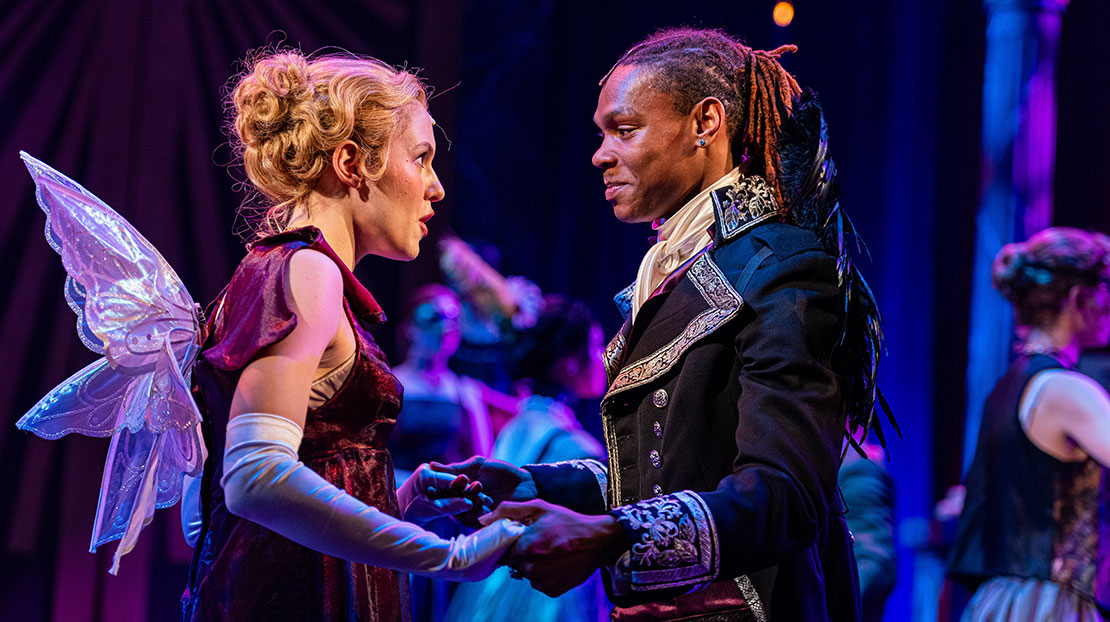
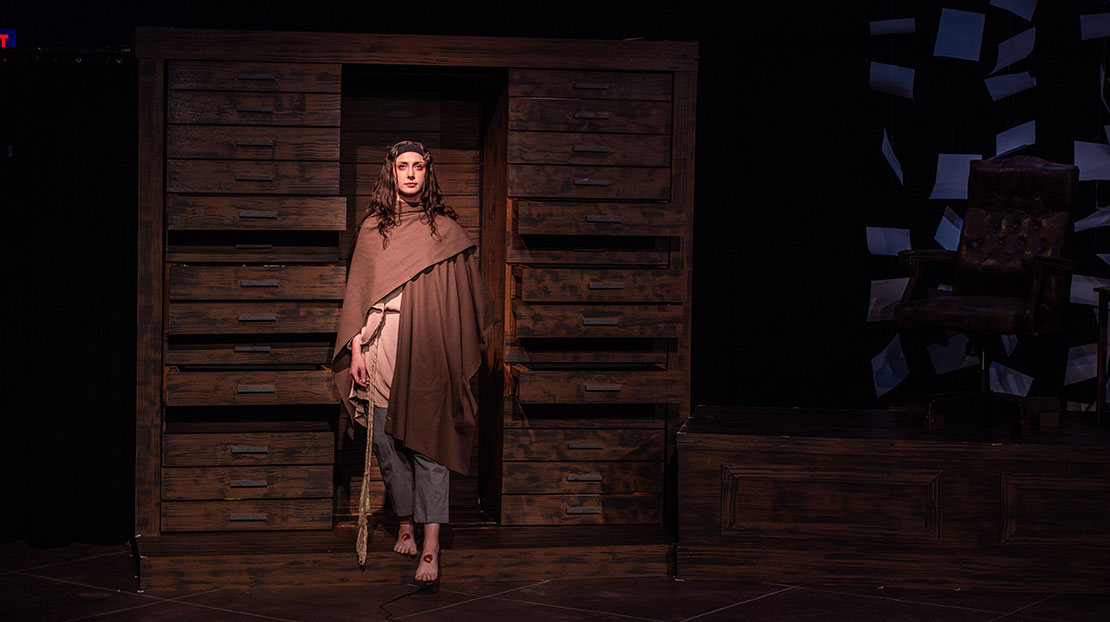

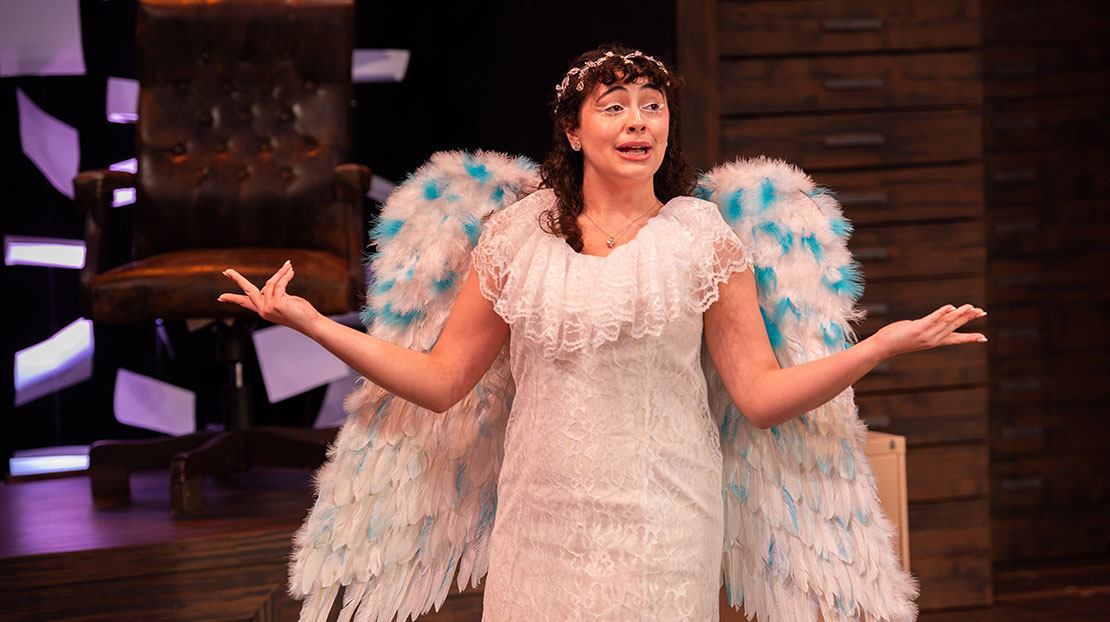
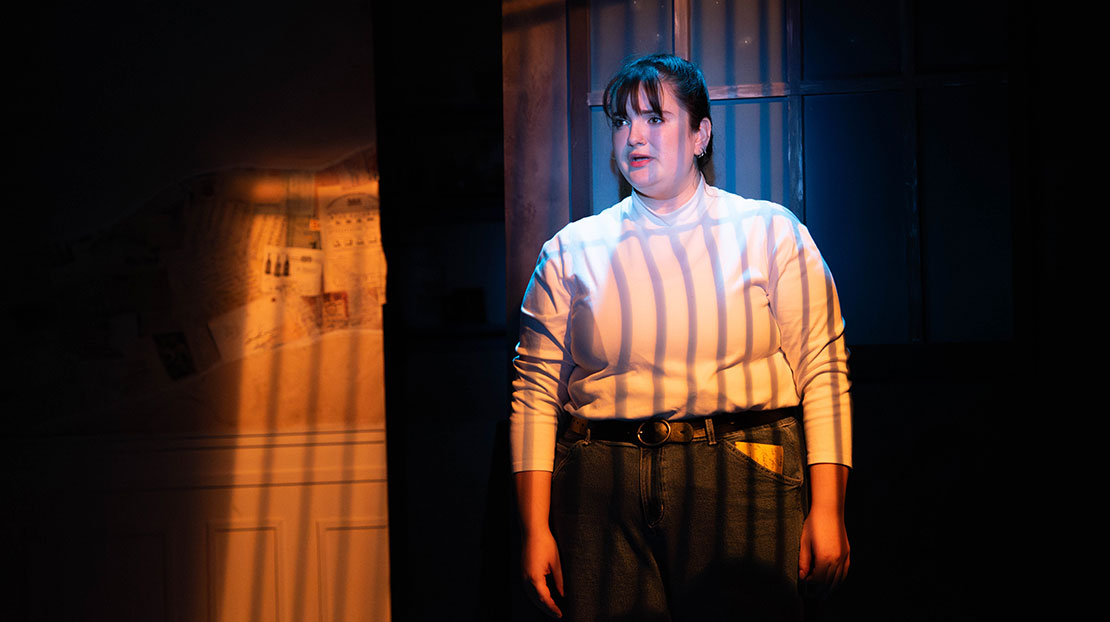
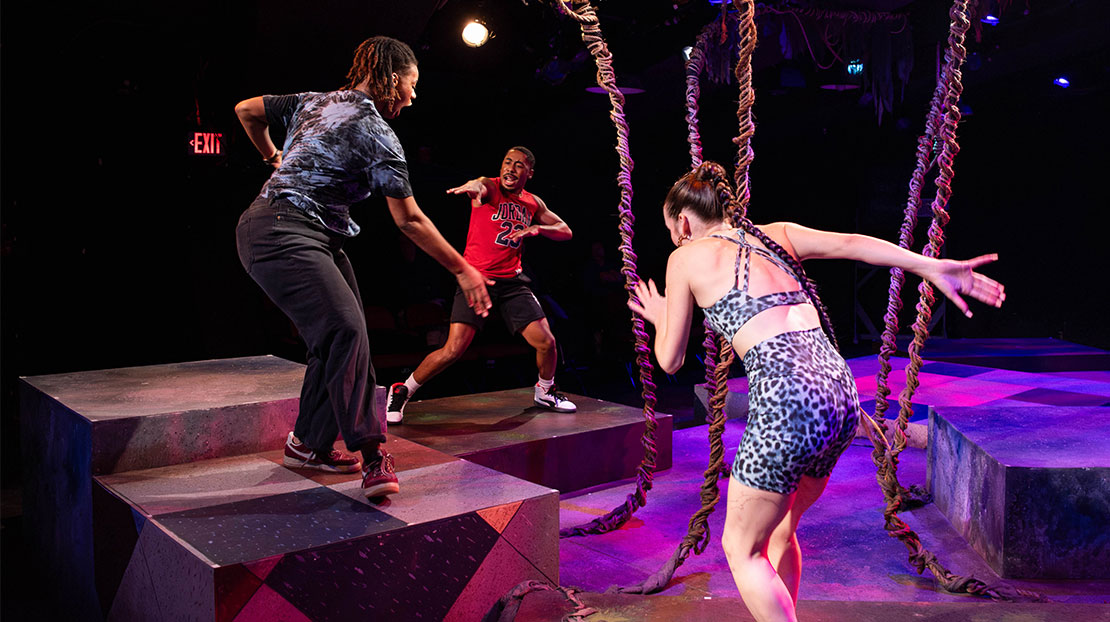
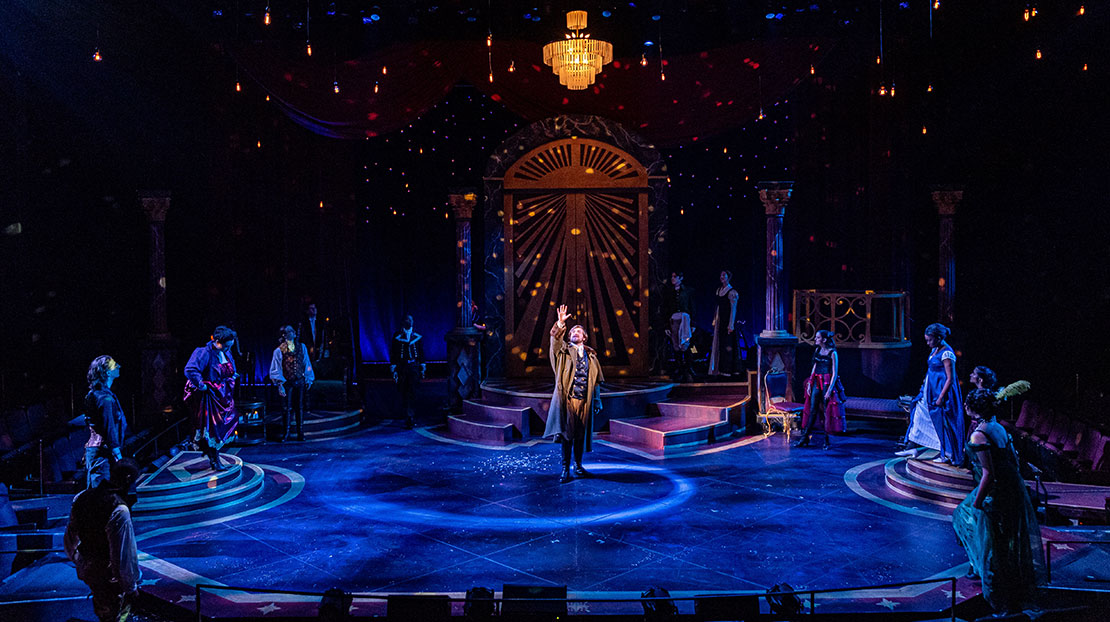
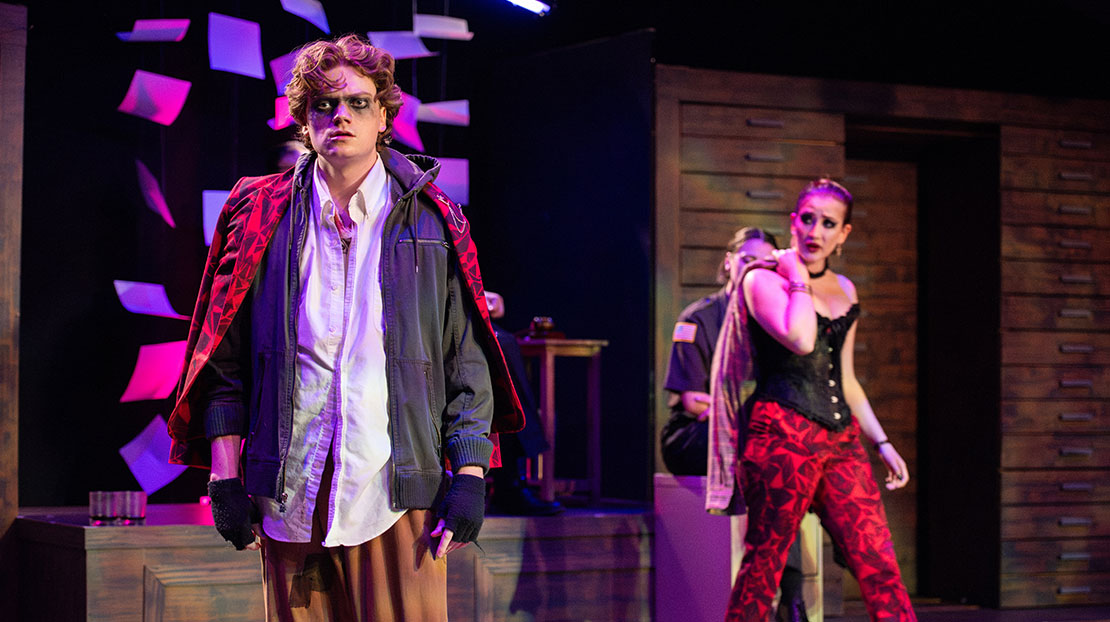
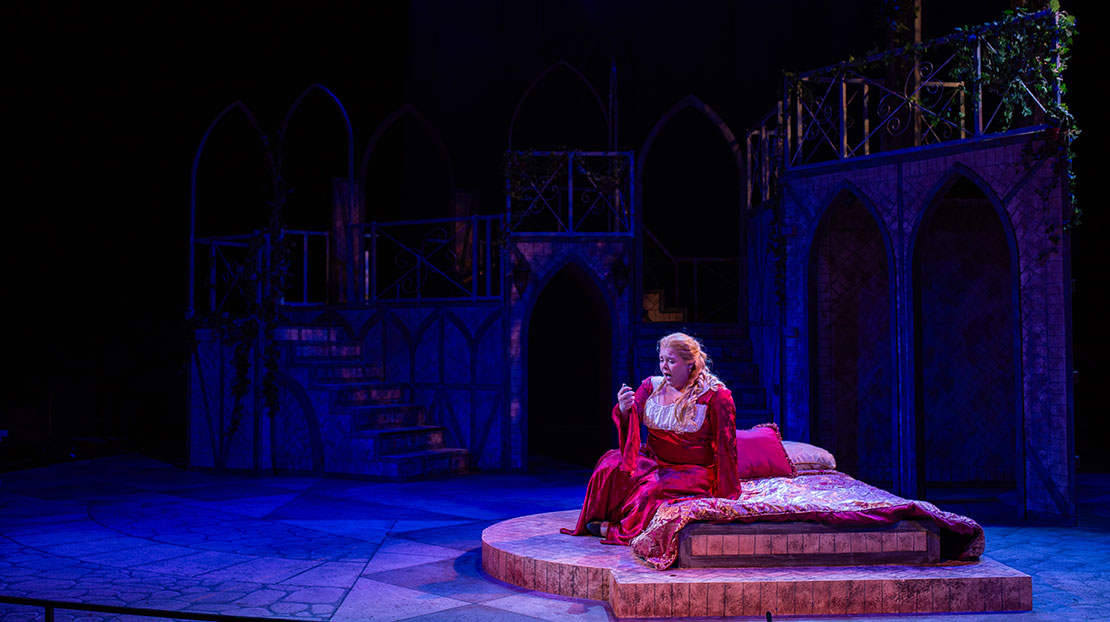
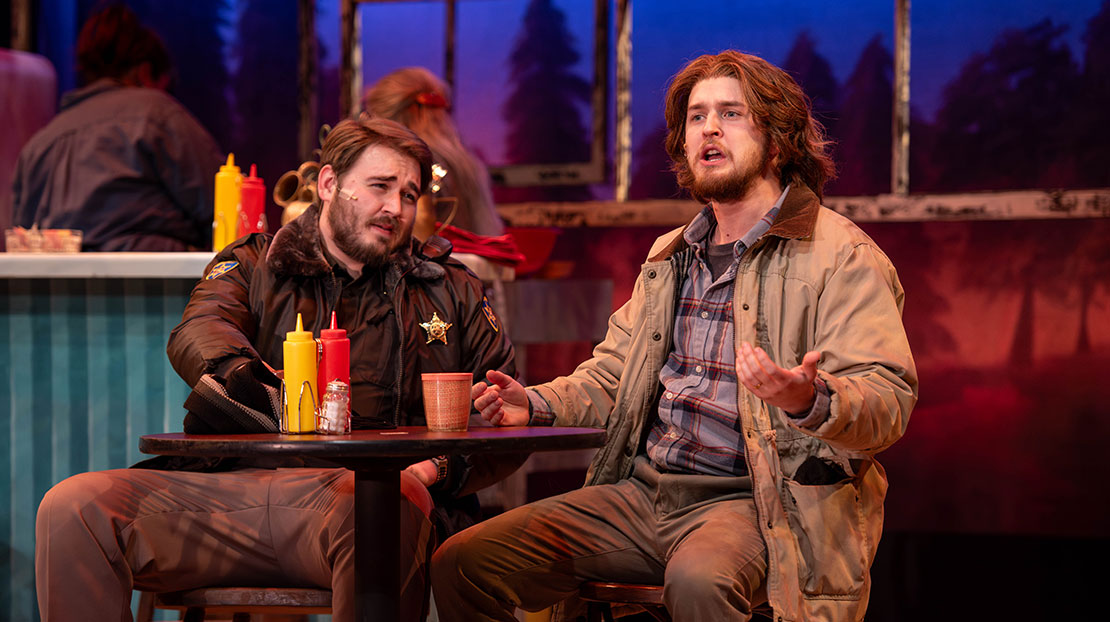
2025-2026 Sargent Conservatory Season
Visit our Box Office for tickets and additional information.
| Show | Dates |
|---|---|
| Seize the King | Sept. 26–Oct. 5 |
| The SpongeBob Musical | Nov. 14–16 |
| The Drowning Girls | Dec. 5–7 |
| The Lightning Thief | March 6–8 |
| In a Word | April 3–5 |
| The Rover | April 24–26 |
Sargent Conservatory and Fine Arts Highlights

In the News February 6, 2026
February 6, 2026
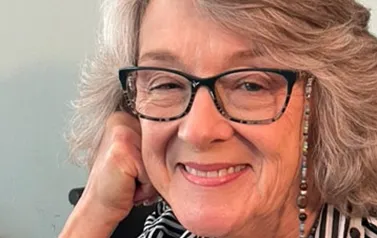
Dorothy 'Dottie' Marshall Englis to Receive the Webster Groves Achievement in the Arts Award
February 4, 2026
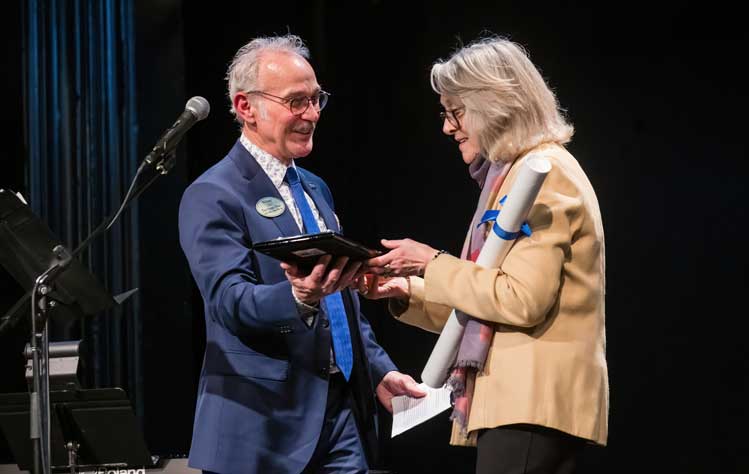
Stage III Renamed The Dorothy 'Dottie' Marshall Englis Theatre
January 26, 2026
